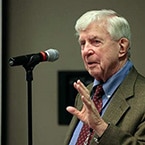
Robert W. Day, MD, PhD, an Emeritus member of the AACR, died January 6, 2018, at the age of 87. He was a longtime cancer center administrator who presided over a period of tremendous growth at the Fred Hutchinson Cancer Research Center.
Day grew up in Framingham, Massachusetts, and attended Harvard University. He earned his medical degree from the University of Chicago Medical School in 1956, as well as master’s and doctoral degrees from the University of California, Berkeley. His medical career was driven by his interest in public health. He was the chief deputy director of the California Department of Public Health when Ronald Reagan was governor. In that position, he drafted the first regulations for MediCal, the state’s health care system for the poor.
He then spent nearly a decade as dean and professor at the University of Washington School of Public Health. In 1981, he joined the Fred Hutchinson Cancer Research Center, where he became the longest-serving president and director in the center’s history. Among his achievements, he oversaw a relocation of the cancer center that allowed for significant growth. The site is now known as the Robert W. Day campus. Day also led negotiations between “Fred Hutch,” the University of Washington, and Seattle Children’s Hospital that led to the creation of the Seattle Cancer Care Alliance.
Day retired from his leadership position in 1997 and remained on the faculty, conducting research on the impact of the Chernobyl nuclear power plant disaster on childhood leukemia. He was appointed scientific director of the International Consortium for Research on the Health Effects of Radiation. He also co-founded Orca Biosciences, a developer of diagnostic blood tests for early detection of cancer.
Day joined the AACR in 1991 and became an Emeritus member in 2002. During his tenure, he was a member of the President’s Circle, served on the State Legislative Committee, and was an editorial board member for Clinical Cancer Research. He was also a member of several scientific working groups and membership groups, including the Molecular Epidemiology Working Group and the Pediatric Cancer Working Group.
Be the first to add a Remembrance.